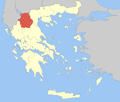Eordaia
Eordaia
Εορδαία | |
|---|---|
 | |
| Coordinates: 40°31′N 21°41′E / 40.517°N 21.683°E | |
| Country | Greece |
| Administrative region | Western Macedonia |
| Regional unit | Kozani |
| Seat | Ptolemaida |
| Area | |
• Municipality | 708.8 km2 (273.7 sq mi) |
| Population (2021)[1] | |
• Municipality | 42,515 |
| • Density | 60/km2 (160/sq mi) |
| Time zone | UTC+2 (EET) |
| • Summer (DST) | UTC+3 (EEST) |
Eordaia (Greek: Εορδαία) is a municipality in the Kozani regional unit, Western Macedonia, Greece. The seat of the municipality is the town Ptolemaida.[2] The municipality has an area of 708.807 km2.[3] The population was 42,515 in 2021.[1]
Municipality
[edit]The municipality Eordaia was formed at the 2011 local government reform by the merger of the following 5 former municipalities, that became municipal units:[2]
Province
[edit]The province of Eordaia (Greek: Επαρχία Εορδαίας) was one of the provinces of the Kozani Prefecture. Its territory corresponded with that of the current municipality Eordaia, and a few villages of the municipality Kozani.[4] It was abolished in 2006.
History
[edit]The history of Eordaia can be found stretching long before 2000 BCE when the first Greeks known as the Mycenean Greeks began to inhabit this area.[5] Remnants of copper mines exploited from 2700 up until 1200 BCE indicate strongly that the Greeks inhabited Eordaia for many years.[5] Iron mines have also been exploited in the region.[5]
Recent discoveries
[edit]Within a 50-year period, paleontologists and archaeologists have made many discoveries due to the industrial development of the Eordaian countryside. In particular, the skeletal fossils of a prehistoric mammoth, a prehistoric elephant, and Stone Age tools have all been found within the province of Eordaia. These finds add to knowledge on the variety of animal species and human artifacts in this particular region of western Macedonia.[citation needed] In addition, two ancient Macedonian tombs have been excavated within Eordaia. The first was located in a rural area of the village of Spilia,[6] while the second was located in the village of Pyrgoi.
References
[edit]- ^ a b "Αποτελέσματα Απογραφής Πληθυσμού - Κατοικιών 2021, Μόνιμος Πληθυσμός κατά οικισμό" [Results of the 2021 Population - Housing Census, Permanent population by settlement] (in Greek). Hellenic Statistical Authority. 29 March 2024.
- ^ a b "ΦΕΚ A 87/2010, Kallikratis reform law text" (in Greek). Government Gazette.
- ^ "Population & housing census 2001 (incl. area and average elevation)" (PDF) (in Greek). National Statistical Service of Greece. Archived from the original (PDF) on 2015-09-21.
- ^ "Detailed census results 1991" (PDF). Archived from the original (PDF) on 2016-03-03. (39 MB) (in Greek and French)
- ^ a b c D. C. Samsaris, Les mines et la metallurgie de fer et de cuivre dans la province romaine de Macédoine, Klio 69(1987), 1, p. 154, 156–157, 169–170
- ^ Macedonian Tomb at Spelia, odysseus.culture.gr



